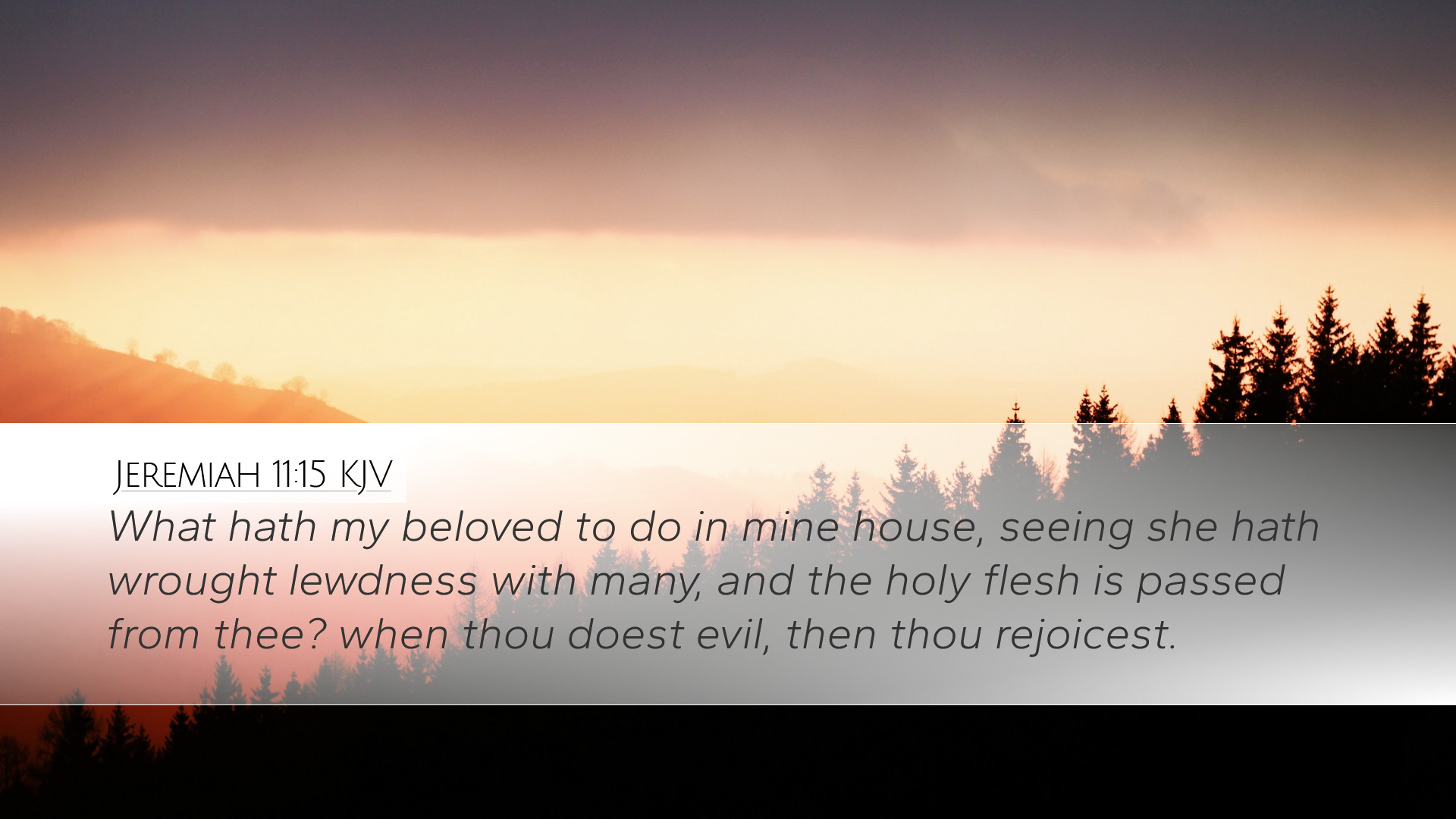Jeremiah 11:15 - "What hath my beloved to do in mine house, seeing she hath wrought lewdness with many, and the holy flesh is passed from thee? When thou doest evil, then thou rejoicest."
Exegesis of Jeremiah 11:15
This verse is a profound indictment of Israel's unfaithfulness and a poignant revelation of God's sorrow over His people's sin. The phrase "What hath my beloved to do in mine house" signifies a relationship that is both intimate and betrayed. The term “beloved” reflects God’s deep affection for Israel, thus highlighting the severity of the transgression committed by His people.
Insights from Matthew Henry
Matthew Henry emphasizes the metaphorical language in this verse. He posits that God likens Israel to a bride who has been unfaithful. Henry notes that the "holy flesh" refers to the sanctified offerings meant for God and that the people have desecrated their covenant with Him through idolatry and immorality. He draws attention to the alarming fact that they continue to rejoice in their wrongdoing, illustrating a profound moral decline.
Commentary from Albert Barnes
Albert Barnes elucidates the context by highlighting the disobedience and covenant unfaithfulness displayed by the people of Judah. He notes that the “lewdness” mentioned in the verse pertains not only to physical immorality but also spiritual infidelity—turning to idols instead of God. Barnes asserts that the language conveys a divine complaint, as though God were asking why He should permit such sacrilegious behavior within His sacred spaces. This draws attention to the gravity of sin that leads to the presence of God being withheld from the people.
Adam Clarke's Interpretation
Adam Clarke interprets the passage with a focus on the societal and religious implications of such a blatant rejection of God’s holiness. He highlights the phrase “the holy flesh” as a reminder of the true offerings that God desired from His people. Clarke suggests that this reflects the nature of their worship—a mixture of right practices corrupted by wrong intentions. His commentary further implies that God’s silence in the face of such sin is a profound statement on His justice and the inevitable consequence of rejection of divine grace.
Theological Reflections
This passage serves as a timely reminder of the seriousness with which God regards His covenant relationships. Here are a few theological reflections:
- Covenant Faithfulness: The imagery used indicates the importance of remaining faithful to God. It raises questions about loyalty, obedience, and the significance of covenant in our relationship with God.
- Divine Disappointment: God’s sorrow illustrates His deep investment in His people. He desires a relationship rooted in fidelity, love, and righteousness, and He mourns their betrayal.
- Seriousness of Sin: The passage teaches about the severe consequences of sin, not just for individuals but for the community as a whole. It serves as a warning against complacency and blind acceptance of sin.
Practical Applications for Ministry
For pastors and church leaders, this verse beckons introspection on both personal and communal levels:
- Call to Repentance: Engage congregations in reflective practices that encourage them to evaluate their fidelity to God.
- Teaching on Holiness: Emphasize the necessity of maintaining holiness in both worship and daily living, akin to Israel’s call to separate from idolatry.
- Understanding God’s Grief: Foster an understanding of sin not just as an offense but as a relational breach that affects God’s heart.
Conclusion
Jeremiah 11:15 serves as a striking metaphor of God's relationship with His people, fraught with love, disappointment, and a call to return to faithfulness. By examining public domain commentaries from Matthew Henry, Albert Barnes, and Adam Clarke, we gain a fuller understanding of the implications of this scripture. It is a clarion call to acknowledge God’s expectations and the weight of covenant commitment, which has eternal implications both for Israel and for modern believers today.


